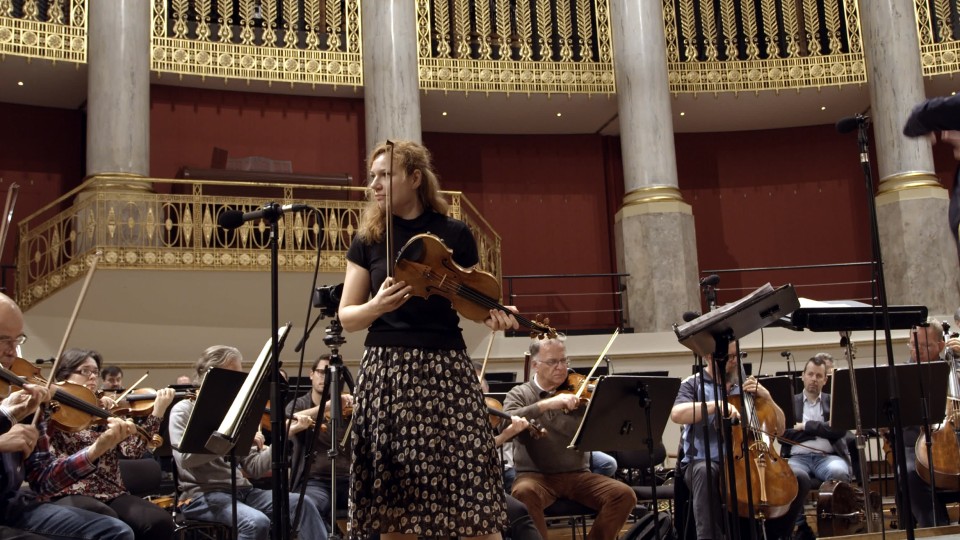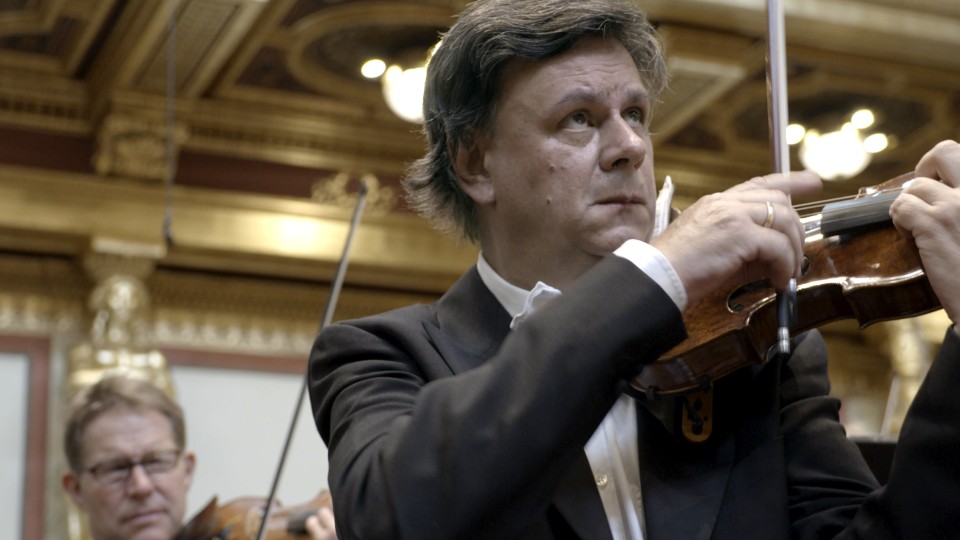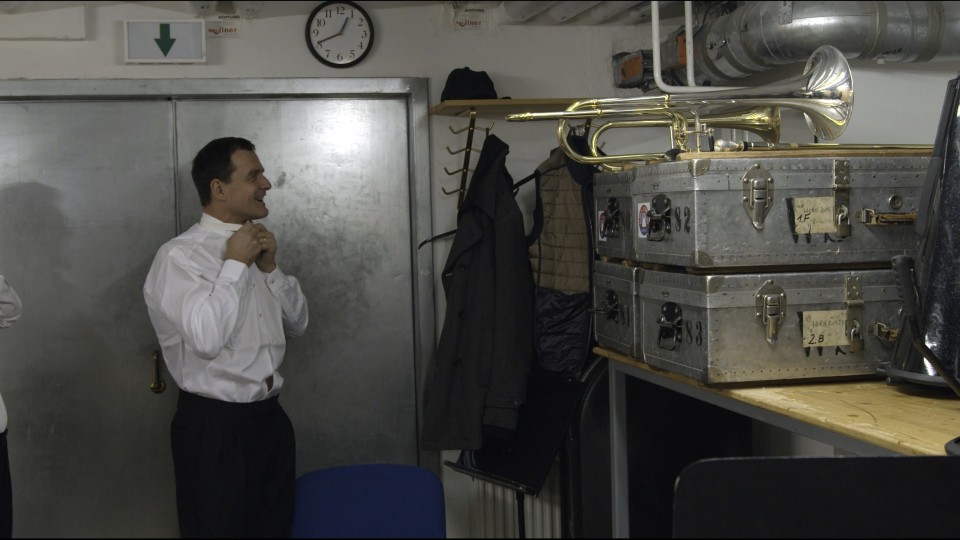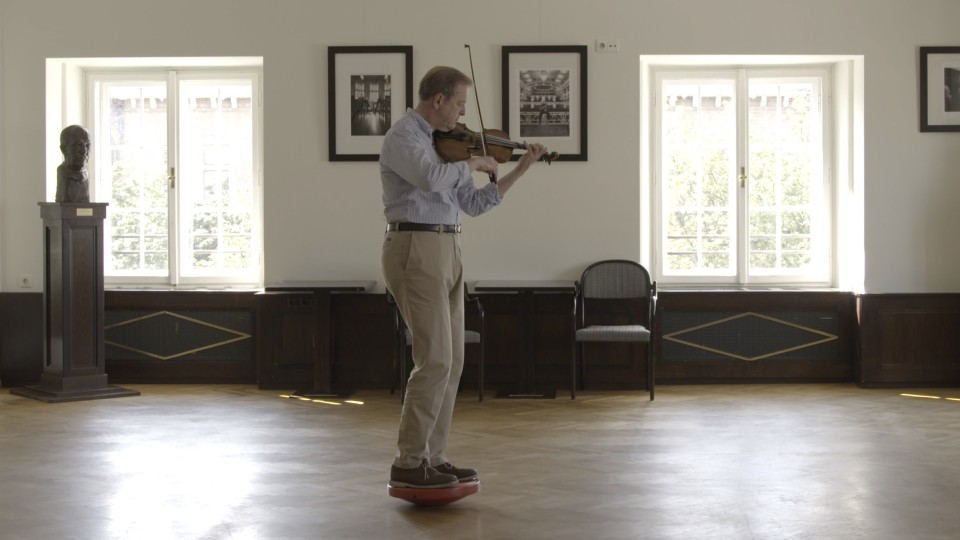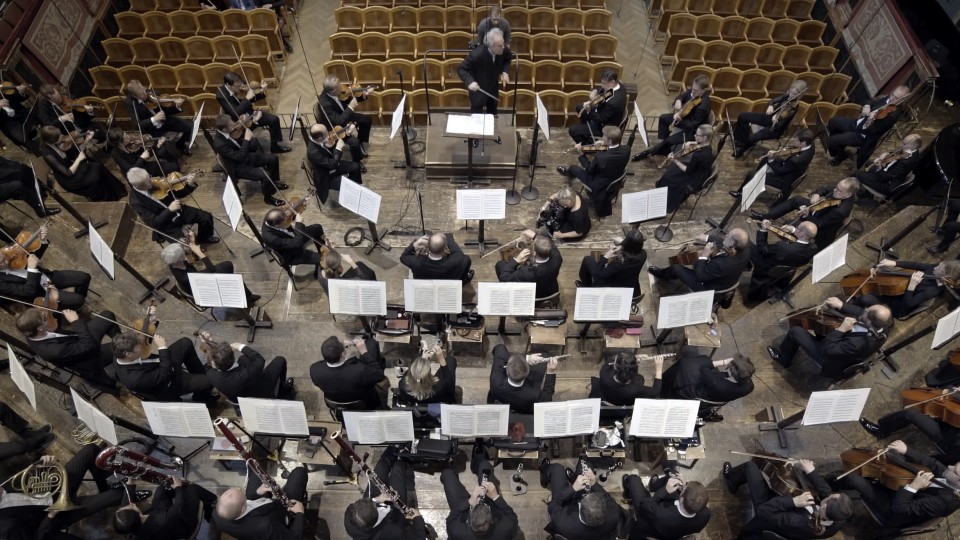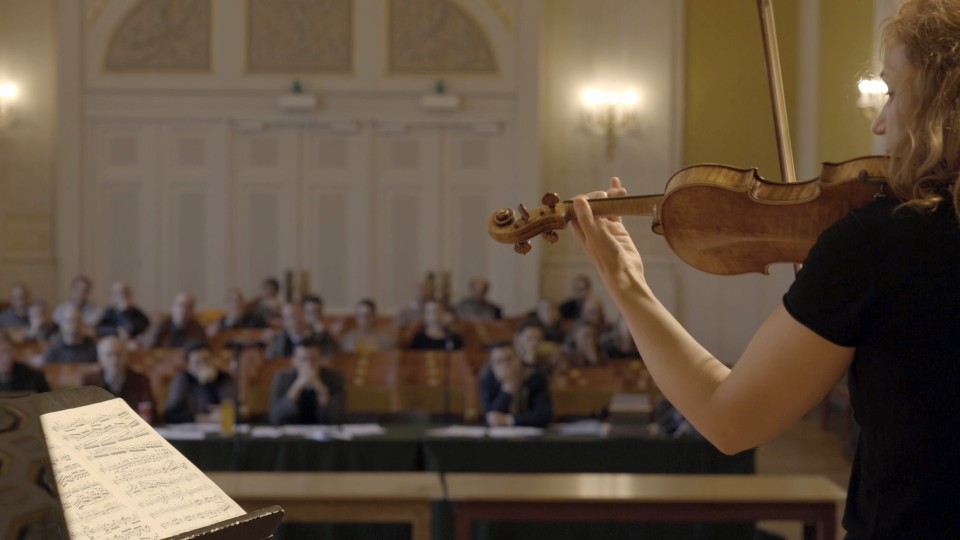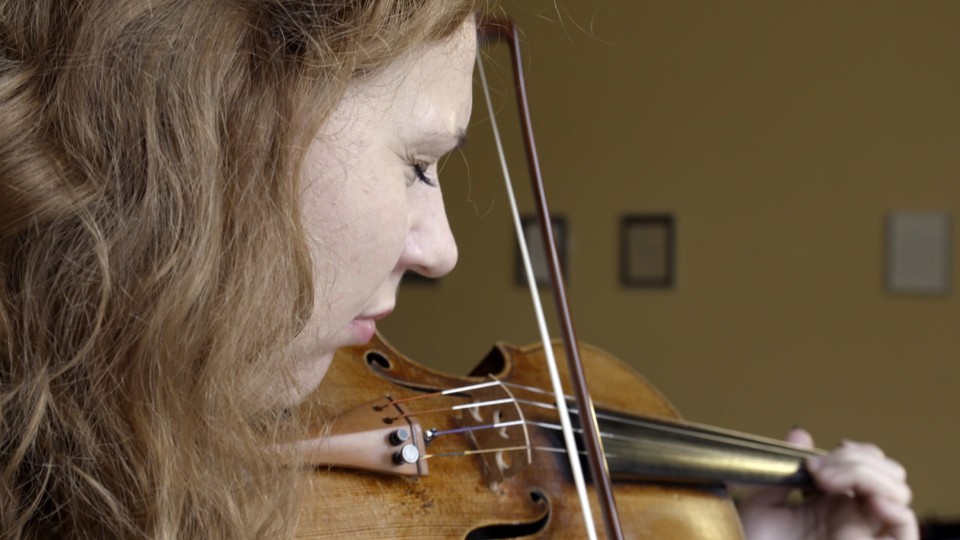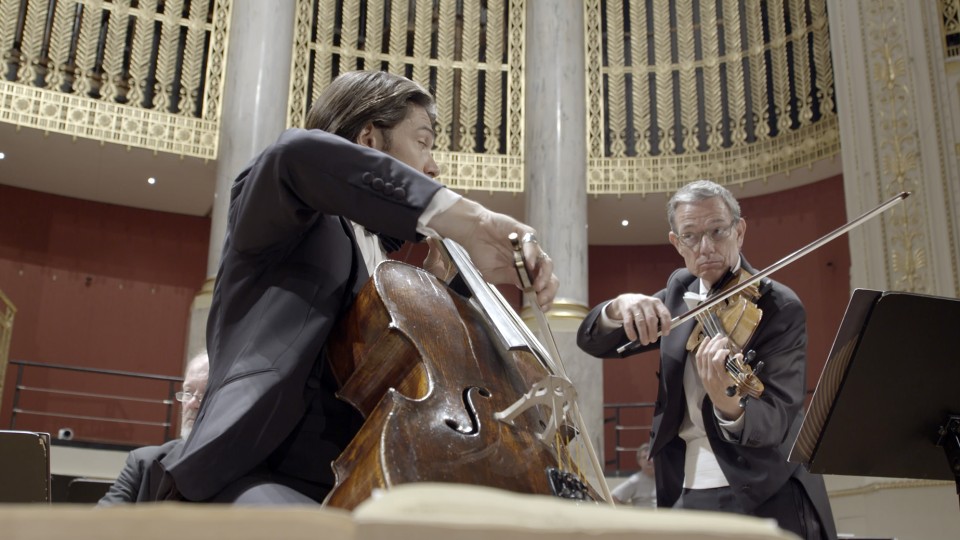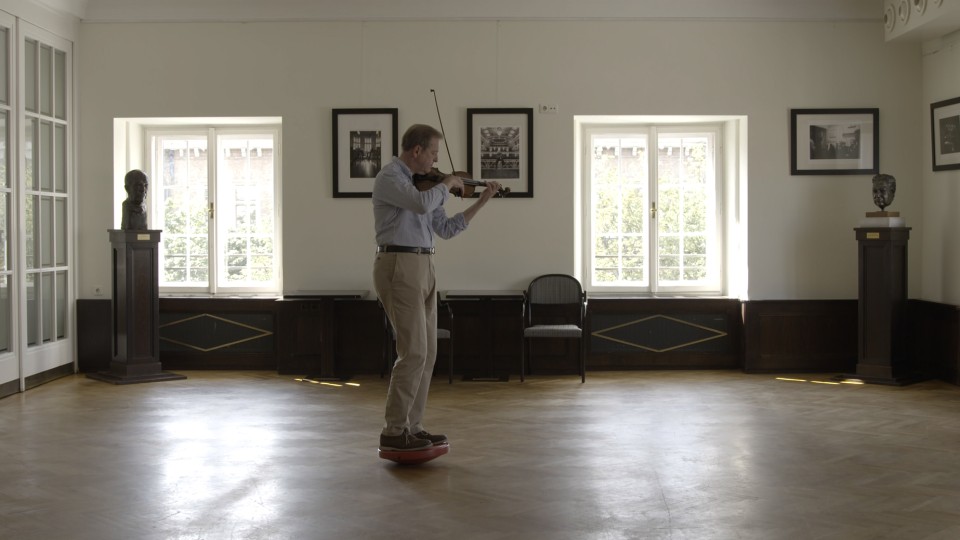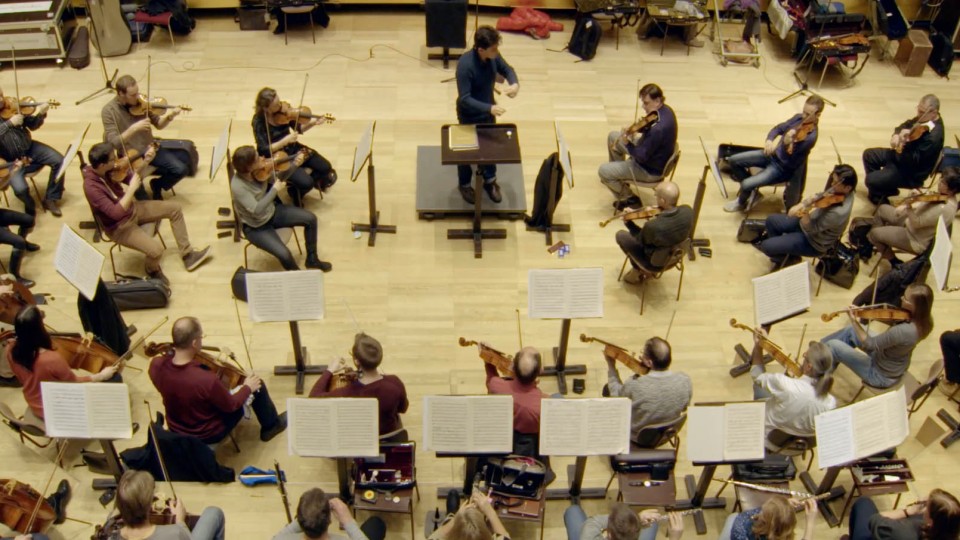The mysterious magic of the harmony it creates prompted filmmakers Iva Švarcová and Malte Ludin to explore the inner life
of an orchestra. In WIRED FOR MUSIC – INSIDE THE WIENER SYMPHONIKER we encounter the famous members of a great orchestra – though concentrating more on those who are generally out of sight –
as they go about their extraordinary everyday lives, accompanied by the highest standards and ambition but also by loneliness
and anxiety.
How did the Wiener Symphoniker in particular come to be the focus of your joint film project?
IVA ŠVARCOVÁ: Whenever I attended concerts I always used to wonder how the cog wheels within an orchestra mesh together: what personalities
and individual characters were behind the sound that we experience as a whole. I thought it would be interesting to somehow
get inside an orchestra and look at them from within. Through a friend we made contact with Philippe Jordan, who was at the
time chief conductor of the Wiener Symphoniker. That formed the basis of this film project.
How did you approach the orchestra and the individual members?
IVA ŠVARCOVÁ: We did a lot of research and had plenty of conversations with individual members, filming them – it was a real audition process.
For the very beginning we were astonished at how sensitive and eloquent the musicians were. For our protagonists we looked
for musicians who were prepared to talk about their hopes and fears, the professional pressures, the perfectionism, the highs
and lows of their careers. It was a process of gradually getting to know one another. Naturally mutual trust is the alpha
and omega of this type of film. The two of us established different sorts of connections to the members of the orchestra,
so we complement each other very well. At an early stage a narrative line crystallized, focusing on the retirement of the
first concertmaster, his departure and the difficult search for a replacement. It was a stroke of luck that we were able to
portray this crucial first concertmaster, Florian Zwiauer, who is also a wonderful first violinist and an impressive character,
although within the orchestra he was associated with a certain amount of controversy.
The title of your film, in both the German and the English versions, focuses on the idea of insight. Was it also important
to you to go beyond the special aspect of the Wiener Symphoniker and its "Vienna sound" in order to capture something universal
underpinning all orchestras?
MALTE LUDIN: We explored intensively the orchestra of the Wiener Symphoniker, analyzing its special features and investigating the different
sections. In the process we learnt what unites top orchestras throughout the entire world: they have to assert themselves
in a highly competitive international market, but at the same time they mustn't lose their roots, their original character.
That's an extremely delicate and complicated task, especially since the very best orchestras, including those in Vienna, increasingly
draw young talent from other countries which are not primarily associated with the Austrian musical tradition.
IVA ŠVARCOVÁ: We wanted to portray an orchestra which works on an exclusively symphonic basis, without singers or a choir, and which is
always subjected to the judgement of the audience. Beyond that, we were interested in the question of what it means to be
a professional musician in such an important orchestra. The members of the orchestra often compare themselves to top athletes,
but they are much more than that. The point is not only technical perfection but also the emotions that they create during
a concert – and experience themselves. These encounters, with first-class artists who were at the same time modest people,
were very impressive. We learned a lot about their profession and about them, but we also learned from them.
The first emphasis established in WIRED FOR MUSIC – INSIDE THE WIENER SYMPHONIKER is on the triangle formed by the conductor, the concertmaster and the orchestra. Was it important for you to stress the fact
that what appears from outside to be a dialogue between conductor and orchestra is in the final analysis a triangular relationship,
and the balance of power is in a state of constant flux?
MALTE LUDIN: The conductor is of course always in the spotlight. But we were interested in the whole ensemble. The horn player Josef Eder
put it very well: "There are conductors who succeed in tapping into the wellspring every musician has inside, and those moments
are the very special ones."
IVA ŠVARCOVÁ: In the film we show four conductors in rehearsal, and the different ways they interact with the orchestra, but we also see
how differently the orchestra reacts to them. We were able to capture very personal moments with the conductors as well as
with musicians. How often is it that a world-famous conductor talks about feelings of self-doubt? By doing so he becomes part
of the orchestra, he becomes a musician, even though he's the boss. On the other hand one of the musicians in the film says:
"If necessary we can manage without them."
The second aspect you focus on involves portraits of individual musicians. How openly did people respond to you?
IVA ŠVARCOVÁ: We were well prepared, but we were still sometimes amazed by their openness. From over 100 members of the audience we picked
out those who were willing to speak openly, and of course that also require considerable courage. They come from different
sections of the orchestra, play different instruments, and consequently they have quite different temperaments. We always
asked ourselves: what kind of influence is in operation? Does the musician influence the instrument, or is it the instrument
that influences the musician?
MALTE LUDIN: We wanted to do something different from the classic concert film which, as a rule, concentrates solely on the celebrities:
the conductor, the first violinist, the soloists, etc. Nobody mentions the "second line", although without their work the
first violinist would never be first violinist. The other members of the orchestra are apparently never asked about their
feelings. We suspect that one reason they were so open with us was because in our film they had the opportunity to express
themselves.
Another theme which becomes extremely important is the emotional aspect, something an outsider might not imagine to be of
such importance: fear, the fear of failing, the pressure to perform and the possible decline in performance. Were you yourselves
also surprised by this?
IVA ŠVARCOVÁ: Fear of failure is a universal theme: we all experience it. But with musicians it lurks everywhere. They are under immense
pressure. They actually never allow themselves to be content with themselves. And later, when they get older, they have to
face the painful recognition that the level of performance they were accustomed to, from themselves, inevitably declines as
the years go by. It is particularly apparent with horn players, who start off in the first positions when they are younger.
Then, as the years go by, they have to withdraw to the second, third and then the last place, the fourth position. It can
also happen that they simply can't play any more, as we were told by a former horn player who had to give up his musical career
completely. That's certainly not a unique case, but it's a taboo subject. We are very happy that we were also able to portray
that aspect of a musician’s life.
MALTE LUDIN: The horn players in the orchestra are particularly exposed, in fact. If they make a mistake, the entire concert hall can hear
it. The horn player Eric Kushner explained that whenever they are playing a particular piece of music he experiences the fear
that he will not achieve the correct note. In the end he found a way of overcoming this fear. But other sections of the orchestra,
such as the string players, have their own problems; the pain might be so bad that they can no longer run the bow cleanly
over the strings. A matter of millimeters can be crucial. I was surprised that the musicians compare themselves with top athletes.
I'd always perceived music as something spontaneous and joyful; I really hadn't expected that pressure to be a constant aspect
of it.
IVA ŠVARCOVÁ: When everything works out and functions properly, the unity of the collective company is felt. It's much more than top performance.
It's a harmony that everybody wants, and the musicians experience it as a kind of euphoria, a feeling of joy. It's a spiritual
space that opens up.
Despite all the pressures, being part of such a famous orchestra is a coveted goal. In the last section of the film the selection
procedure comes to the forefront.
IVA ŠVARCOVÁ: An audition is the moment of truth. During those few moments the musicians must have nerves of steel and "deliver the goods",
as they say. They have to play perfectly and unite their souls with the instrument. It's the most feared and most sought-after
moment in the life of every professional musician.
MALTE LUDIN: The first audition is always held behind a screen, for reasons of objectivity. I don't think I’d be able to withstand a situation
like that. The procedure goes through several rounds, and all that counts in the end is the person who is chosen. And even
then they are faced with a year’s trial period. It is extremely hard.
IVA ŠVARCOVÁ: As well as all that, there's the question of whether a new addition fits in with the group. Human and social components also
play a great role here. After all, a career in an orchestra extends over several decades, up to retirement age. Everyone is
sitting so close to each other that the chemistry also has to work.
For you as filmmakers, was WIRED FOR MUSIC – INSIDE THE WIENER SYMPHONIKER unlike your previous projects in that the challenge extended to an acoustic level as well as visual one?
MALTE LUDIN: Every film involves particular challenges. The acoustic issue, the problem of how to deal with symphonic music, which we don't
celebrate as a source of pleasure but present as a working process, was definitely a particular challenge
IVA ŠVARCOVÁ:
as was establishing contact with musicians, maintaining that and intensifying it. The members of the Wiener Symphoniker
are sensitive beings, and if you don't treat them with patience and care they quickly back away.
Interview: Karin Schiefer
May 2020
Translation: Charles Osborne

